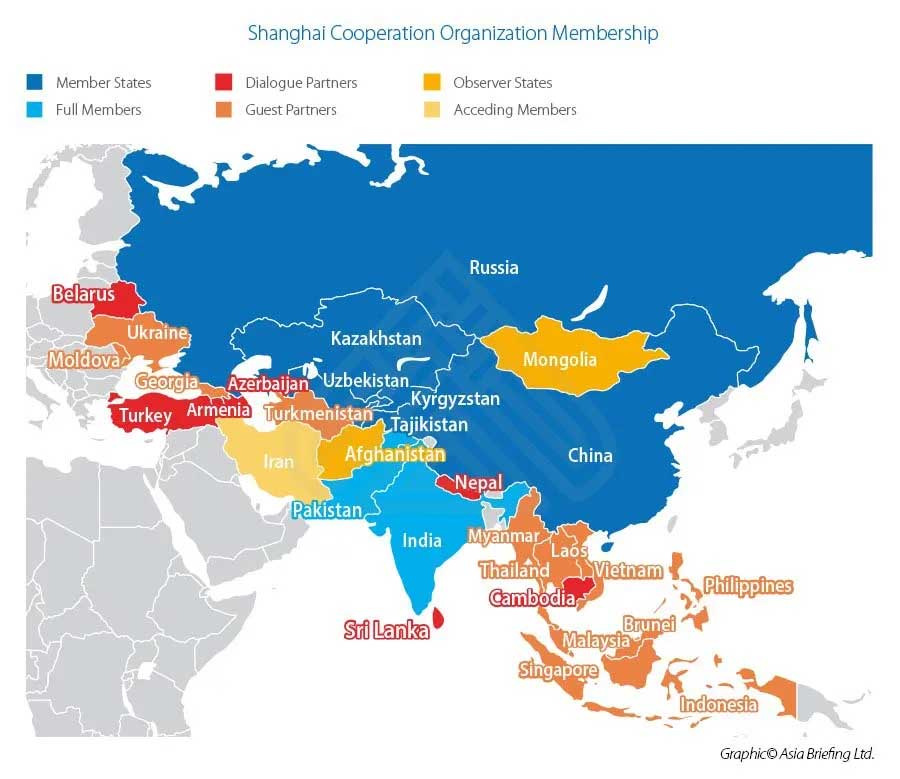Shanghai Cooperation Organisation & Eurasian Economic Union To Strengthen Economic Partnership
Meetings to discuss Economic Cooperation have been held between Mikhail Myasnikovich, the Chairman of the Eurasian Economic Commission (EEC), and Zhang Ming, the Shanghai Cooperation Organisation (SCO) Secretary-General in Moscow. These discussions were reported by the Eurasian Economic Commission here.
Taking place on March 17, they preclude the on-going Putin-Xi Presidential Summit and will have prepared the way for expected agreements between China and Russia on developing trade structures and institutions.
The EEC is the Governing authority for the Eurasian Economic Union (EAEU), which includes Armenia, Belarus, Kazakhstan, Kyrgyzstan, and Russia. It is a free trade group that sits between the borders of Eastern Europe, and Western China. The EAEU has free trade agreements with China (currently non-preferential, although negotiations are underway to re-assess this), Iran, Serbia, and Vietnam. Several other countries are also negotiating FTA with the EAEU, among them Egypt, India, and Indonesia.
The SCO includes eight member States (China, India, Kazakhstan, Kyrgyzstan, Russia, Pakistan, Tajikistan, and Uzbekistan), four Observer States interested in acceding to full membership (Afghanistan, Belarus, Iran, and Mongolia) and six “Dialogue Partners” (Armenia, Azerbaijan, Cambodia, Nepal, Sri Lanka, and Turkiye). In 2021, the decision was made to start the accession process of Iran to the SCO as a full member, while Egypt, Qatar, as well as Saudi Arabia, became dialogue partners. Proposed new dialogue partners include Bahrain, the Maldives, Myanmar, Kuwait, and the United Arab Emirates.

The meetings focused on the strengthening of practical joint work in the transport and logistics sector, as well as to stimulate the integration of currency payment systems for independent cross-border payments.
According to Myasnikovich, the economic agendas of the SCO and the EAEU have the potential to complement each other and define the global landscape. “In 2022, the trade turnover between the EAEU and the SCO amounted to US$270.2 billion, having increased by more than 40% in 2022,” he said.
Myasnikovich also said that the Commission had prepared a concept for the implementation of a transport and logistics megaproject designed to link together the territory of the Eurasian region. This project is currently being considered by the SCO.
Both Myasnikovich and Zhang stressed the importance of increasing mutual settlements in national currencies and cooperating in developing integrating currency payment systems for independent cross-border payments, trade and investment financing. Commenting on this, Myasnikovich said “There are good developments in the EAEU, by the end of 2022, the share of settlements within the Union in national currencies amounted to 80%. We believe that it is necessary to ensure synchronization of the potentials of the payment and settlement infrastructures of the EAEU and the SCO. We will present our proposals in the near future.”
Both parties confirmed their interest in signing the Plan of Joint Actions for the Implementation of the Memorandum of Understanding between the EEC and the SCO Secretariat. The document is at the final stage of approval and its signing could take place in May this year, most likely at the Second Eurasian Economic Forum, which will be held on May 24-25 in Moscow. During the Forum, a special session “EAEU – SCO – BRICS: Open Integration Dialogue” will be held.
These discussions are important as the bring forward the likelihood of an eventual merger of the Eurasian Economic Union with the Shanghai Cooperation Organisation and an expanded BRICS.
This will take time to implement but would create a massive, globally reaching trade bloc that would dwarf the United States and European Union by comparison and dramatically alter the geopolitical trade aspect of international commerce for the second half of the century.
Related Reading





